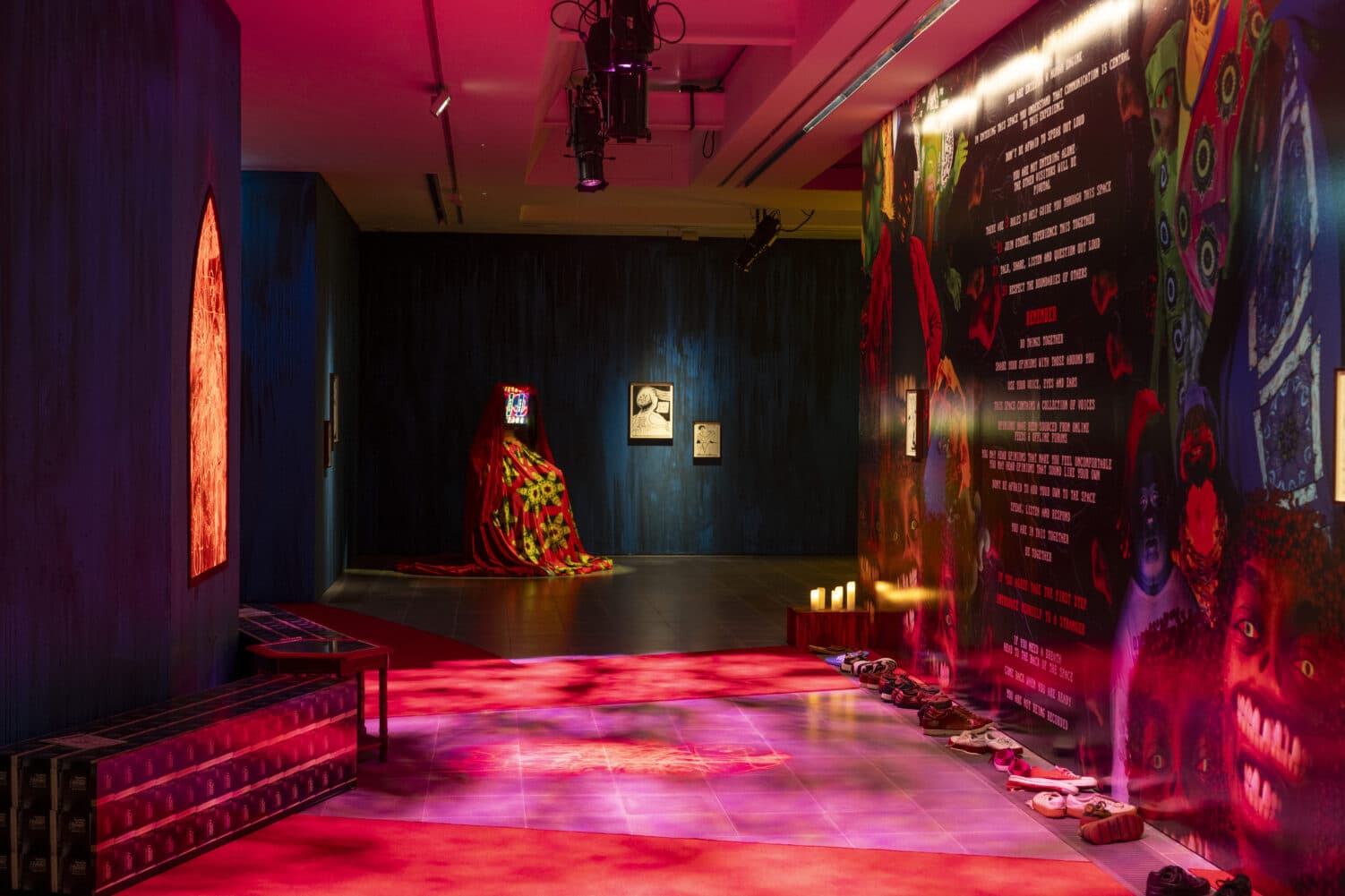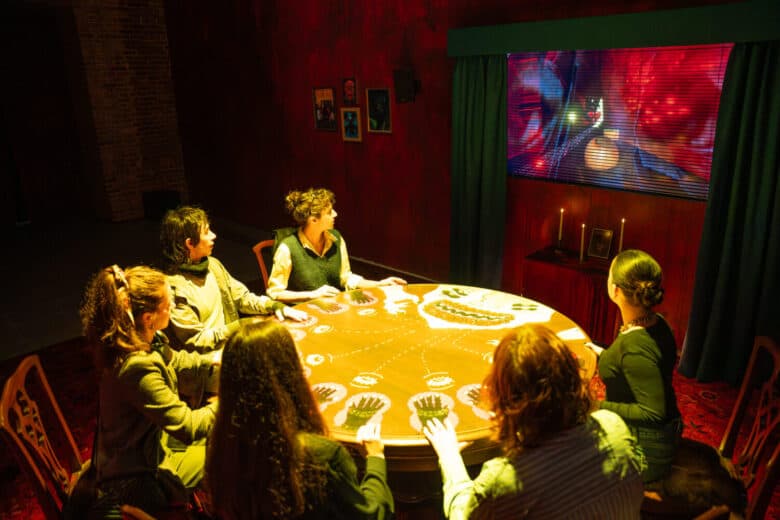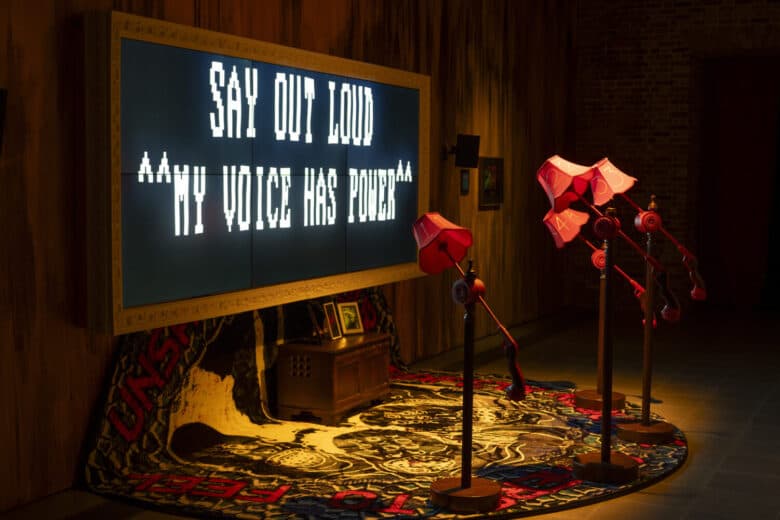Arty Appetite — The Delusion at the Serpentine North Gallery

After a digital rapture in which every online comment comes true, The Delusion lifts those ‘aboard’ to safety. It’s a little like the internet trend seen this September, except it moves away from the digital world of TikTok, and invites others besides American Evangelical Christians and conspiracy theorists to partake. Inside the exhibition, the neon-lit, conceptual space shuttle provides a welcome escape in the form of a selective community. Here, only those deemed ‘safe’ are allowed inside. As passengers, it’s up to visitors to decide who they permit into this protected space, their responses providing data which determines whether the next twenty-minute interactive loop of gameplay will be guided by hope, fear or hatred. It’s this question that sits at the core of The Delusion: what will, or should, you let guide your decisions?
These three key emotional states complement what Danielle Brathwaite-Shirley pulls on for her exhibit at the Serpentine North Gallery. Inspired by time spent with her grandmother, religious references are scattered throughout the space, while the influence of vintage video games, like The Backrooms, manifests in a scrawled stained glass window separating the outside world from the cave of The Delusion. The artist’s terms and conditions read like dogma, greeting visitors as they enter the gallery — a sartorial mirror to the Bible-covered benches opposite and the pillar candles easily spotted throughout. Equipped with the rules of participation, namely to read out loud and respect others visiting, it’s time to step on board this floating, exclusive community.

On the first run-through of the day, ‘Callings’ proclaim ‘hope’ has been selected. These silk-draped monitors reference the history of debate in Speakers Corner and read out a selection of quotes fuelled by, in this case, hopeful feeling. With four ‘Callings’ in total, it’s hard to escape the often threatening tallies on screens as each emotion’s ‘bar’ starts to fill up. There are countless ways to move around the triplet of game rooms, but the most likely route begins with ‘I Didn’t Realise You Thought Like That’. Here, a door stands in front of a digital screen, backed with faux-ripped walls that lead to the unpredictable outside. It’s up to visitors to man the door and decide who earns the right to come on board. Digital characters walk up to the LED screen and, by closing or opening a physical door, can bar or welcome others, taking in their appearance, tone and the statement that comes with them. It’s not just what we’re willing to listen to, but who we choose to give our time to.
Where this ‘first’ game compels the individual to act — and implicitly reveal themselves to the surrounding observers — ‘I Can’t Move With You’ emphasises decisions made from a pool of experience and insight. Using an interactive seance table as an inelegant remote control, those seated around the table guide a ball through a digital maze projected on screen. Statements line the maze’s wall — changing with The Delusion’s emotional context — and a final prompt ask players to stay after the game’s end, extending this communal effort into a real-world conversation. Even with the terms and conditions laying out the artist’s emphasis on discussion throughout the exhibition, it’s still a surprise when visitors do just that. Sitting round the table, on my second tour of the exhibit (when fear guides the games), a group of eight discuss polarisation from a multilingual perspective, one visitor explaining the absence of ‘banned’ words in Portuguese. In an age of isolation, it seems that we’re all just waiting for permission to speak.
The final game in this convoluted emotional triptych mixes this collaborative energy with solo judgement, asking visitors to ‘shoot’ anglepoised lamps at statements with ‘vote’ credits they collect through the game. In this version of ‘I Don’t Know If I Can Be Honest In Front of You’, these decisions are guided by fear, the ‘self-censor 500’ telling visitors to eliminate beliefs from the world. For example, deciding to reveal or ‘remove’ forever something you couldn’t share at work or something you couldn’t share with your family. The gamification clearly works to get people engaged — but there are points at which people seem more interested in the act of shooting than actually reflecting on these choices. Numbered lamps and cursors mean each decision can be tracked, but the group context — rather than the solo action of opening and closing the door — seems to free people’s (metaphorical) tongues. It’s entertaining to watch as people collect votes to decide between two often equally-bad options. It’s far less entertaining when this anonymity sees players repeatedly vote on, for instance, anti-trans rhetoric.


The game itself confronts these choices, telling players that “your fears won’t save you”. In The Delusion, you might be free to make decisions, but Braithwait-White ensures there’s no ‘easy’ answers. Here, the reflection exercise that comes after each twenty-minute loop of gameplay encourages visitors to reflect on their own power, literally reading the words out “my voice has power”, and marching to regular beat. Engaging physically with self-reflection seems too high an ask as most of the players abandon the lamp that gave them such power before. When ‘fear’ is in command, it seems any choice is better than none — even when there’s no winning the game.
A ‘safe room’ comes as a welcome relief. There’s space to sit and think, to carry on those conversations under the watchful eyes of large grinning faces printed onto cushions — but the sound proof curtains can’t shut out all the outside noise. Looping round the space, testing out games under different conditions, ‘fear’ and then ‘hate’ win out. Just before we leave and walk back out into the sunshine, it’s reassuring (even as thorough challenges to ‘hate’ and ‘fear’ are integrated throughout) that ‘hope’ ultimately supersedes. There’s no winning The Delusion, but perhaps this is as close as we’ll get. For this afternoon at least.
The Delusion runs at the Serpentine North Gallery until 18 January 2026.
- WriterDaisy Finch
- Image CreditsDanielle Brathwaite-Shirley / Hugo Glendinning




